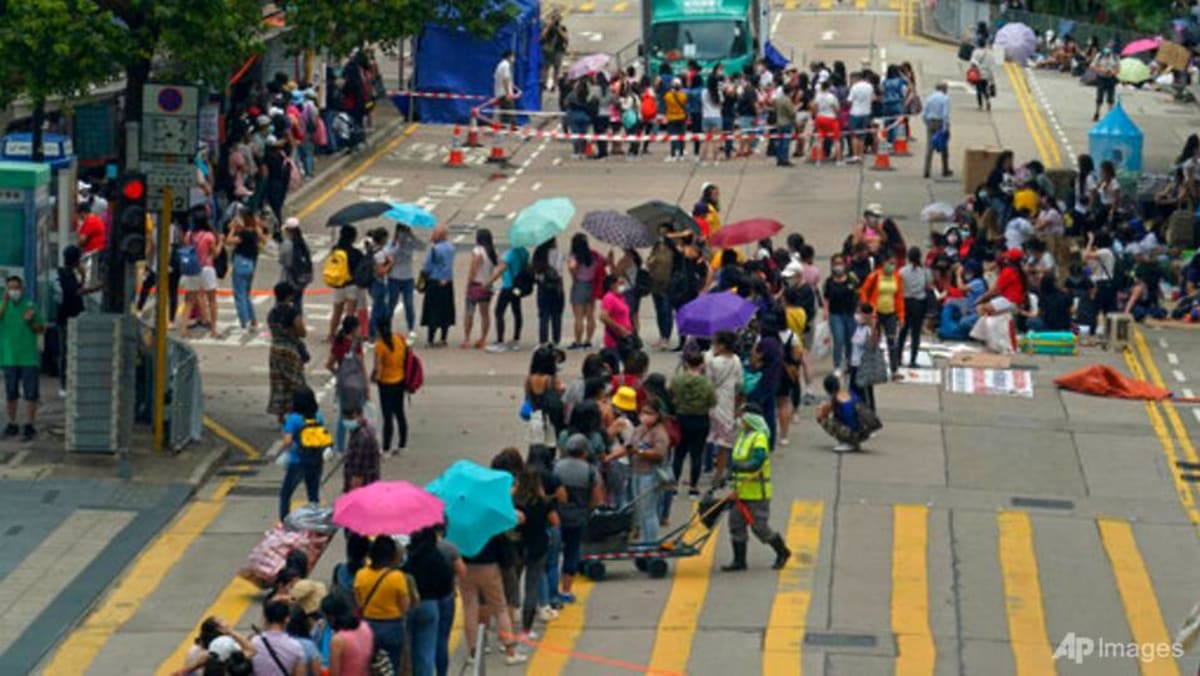
The constantly changing system has left some like Mimi Rios Ysulat, who worked in the city as a helper for a decade, stuck overseas without a job.
She went back to the Philippines early last year after her husband died of cancer in March.
Ysulat was due to return to Hong Kong the following month, but the city enacted a flight ban and then her entry visa expired in June.
She pleaded with her employers to renew it, but a new visa didn’t arrive until mid-October, by which point her bosses had terminated her contract.
It was the second time she’d been caught by restrictions, after being blocked from returning in early 2020 before eventually making her way to Hong Kong via Singapore.
To return again, she’ll need to use an employment agency.
“I can’t find work here and I have to take care of three kids,” she said from Quezon City.
“But if I apply to go to Hong Kong again, I’d have to pay almost HK$10,000 to the agency. Where can I find the money?”
It’s a substantial sum when the minimum wage for foreign domestic helpers is roughly a quarter of the Hong Kong median salary of HK$18,400.
The lack of income reverberates through families that rely on money sent back home, total remittances to the Philippines are about US$30 billion a year, according to the government, and account for roughly 8 per cent of its gross domestic product.
It’s also a hit to the typically thriving industry in Hong Kong that matches workers with bosses, with one agency saying the business had dropped to just half of the normal levels.
Karishma Sakhrani, a 41-year-old interior designer seeking someone to take care of her teenage children, says everyone she’s spoken to recently has requested a monthly salary of at least HK$6,000.
She’s been surprised that some have a list of requirements, including not sharing a room with others, and said she’s troubled by stories of workers ending their contracts early to take better-paid jobs in other households.
“I can’t judge people for wanting more money, but I think there should be a system,” she said.
“Even if you’re in a company, you have to work a few years before a raise. You can’t just demand higher pay in the middle of the contract.”
Domestic workers say they’re being singled out for doing what’s accepted in other professions.
“Everybody else in Hong Kong can freely switch jobs, why not us?” said Eni Lestari, a helper, advocate and chair of the International Migrants Alliance.
“The Hong Kong government is promoting modern-day slavery.”
The Immigration Department declined to comment beyond referencing a Jan 19 response from Secretary for Security Chris Tang that the department has been “proactively” combatting job-hopping, workers deliberately underperforming so they’re fired.
It refers suspicious cases to a special team that considers factors such as the conduct of foreign domestic helpers, records from workers and their former employers and the reasons behind the premature termination of a contract, he said.
In Hong Kong, both helpers and bosses can end a contract early.
Authorities rejected 2,833 visa applications last year due to job-hopping, meaning workers can’t legally enter or work in the city, up from 319 in 2020.
Even as the growing labour crunch offers a potential rebalancing of power, fear of being labelled a job hopper and having a visa revoked, or of getting stuck outside Hong Kong when fulfilling a requirement to exit and re-enter between contracts, is one of the biggest barriers to seeking out higher salaries.
“They stay because they have no better alternative,” said Lestari.
https://news.google.com/__i/rss/rd/articles/CBMiYGh0dHBzOi8vd3d3LmNoYW5uZWxuZXdzYXNpYS5jb20vYXNpYS9ob25nLWtvbmctZmFjZXMtZG9tZXN0aWMtd29ya2VyLXNob3J0YWdlLWNvdmlkLXplcm8tMjQ1ODIyMdIBAA?oc=5
2022-01-25 08:37:00Z
1261049296
Tidak ada komentar:
Posting Komentar